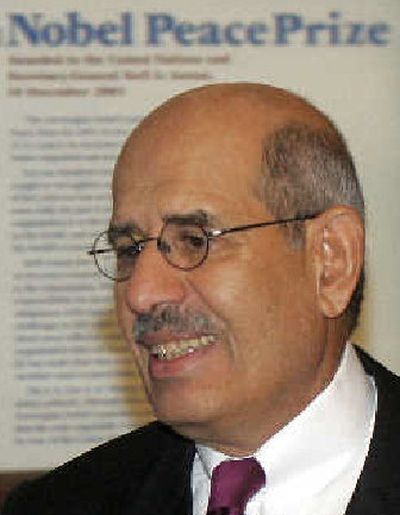Nobel Peace Prize goes to atomic energy agency leader

LONDON – Mohamed ElBaradei, who angered the Bush administration by disputing its claims that Saddam Hussein’s regime had an active nuclear weapons program, won the 2005 Nobel Peace Prize on Friday, sharing the award with the International Atomic Energy Agency, the U.N. agency he leads.
ElBaradei, as the IAEA’s director general, has been a central figure in efforts to monitor the nuclear programs of North Korea and Iran, and he had publicly pressed for his agency’s weapons inspectors to be given more time to search Iraq for weapons of mass destruction before the American invasion.
Seeking a third four-year term this year as head of the IAEA, ElBaradei was initially opposed by the Bush administration. Nevertheless, his popularity with other member countries was such that the administration dropped its opposition and ElBaradei was re-elected.
“I’m extremely humbled and honored,” he said Friday at IAEA headquarters in Vienna, Austria, after being taken by surprise when he saw the Nobel announcement live on television at his home. “I think the prize recognizes the No. 1 danger we are facing today, and that is the threat of proliferation of nuclear weapons.”
The Norwegian Nobel Institute’s prize committee said it hoped the prize would draw attention to the IAEA’s nonprofileration programs.
“The director general has stood out as an unafraid advocate” for nuclear nonproliferation “at a time when the threat of nuclear arms is again increasing,” the Nobel committee chairman, Ole Danbolt Mjoes, said in announcing the award in Oslo, Norway. ElBaradei and his agency are being recognized “for their efforts to prevent nuclear energy from being used for military purposes and to ensure that nuclear energy for peaceful purposes is used in the safest possible way.”
Mjoes said the award was not intended as criticism of the United States.
ElBaradei, 63, was born in Egypt, schooled in diplomacy at the University of Cairo and in law at New York University. He became a hero in the eyes of much of the Arab world for sticking to the findings of his inspectors in Iraq despite intense American pressure.
His critics accuse him of putting up with too much deception from countries such as Iran, but ElBaradei argues that he is accommodating at times so that his inspectors can stay on the ground.
The IAEA, established by the United Nations in 1957, coordinates nuclear safety around the world and monitors materials that could be diverted for weapons use. The agency, publicly represented by ElBaradei, combines diplomacy with science, conducting inspections around the world as thoroughly as possible while trying not to be so intrusive that countries kick out inspectors.
It has played pivotal investigative roles in four major crises in recent years: Iran, Iraq, North Korea and the nuclear black market run by one of Pakistan’s top scientists.
The Nobel Committee said ElBaradei and the IAEA should be recognized for addressing one of the greatest dangers facing the world.
“At a time when the threat of nuclear arms is again increasing, the Norwegian Nobel Committee wishes to underline that this threat must be met through the broadest possible international cooperation. This principle finds its clearest expression today in the work of the IAEA and its director general.”
A record 199 nominations were received for the prize, which includes $1.3 million, a gold medal and a diploma. ElBaradei and the IAEA will share the award when they receive it Dec. 10 in the Norwegian capital.